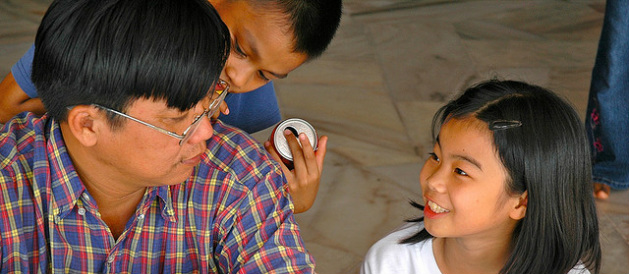|
Good communication helps children to develop confidence, feelings of self worth, and good relationships with others. It makes life with them more pleasant, and helps them grow into adults who respect themselves and others.
1. Communicate acceptance: Accepting the child just as he is makes it easy to communicate with him. The child who feels accepted will be more likely to share his feelings and his problems. 2. Use door openers: Door openers are invitations to say more, to share ideas and feelings. They tell the child that you are really listening and interested, that his ideas are important, and that you accept him and respect what he is saying. 3. Use “you-messages” to reflect the child’s ideas and feelings: “You-messages” describe the child’s feelings and encourage him to express his troublesome feelings. When children are allowed to express bad feelings freely, they seem to disappear like magic. 4. Use more do’s than don’ts: Tell the child what to do rather than what not to do. The Don’ts: “Don’t drag your coat on the ground. The Do’s: Hold your coat so it doesn’t drag. 5. Listen attentively: Get rid of distractions and listen to what the child is saying. 6. Use “I-messages” to communicate your thoughts and feelings: Often children don’t know how their behavior affects others. “I-Messages” are effective when the child misbehaves. 7. Make requests simple: Because young people have a hard time remembering several instructions at once. 8. Say “please”, “thank you”, and “you’re welcome” to children: Children deserve the common courtesies which adults use with each other. And children learn by imitating the speech and behavior of adults. Let them learn good things from you. 9. Communicate at eye level: When talking with very young children, it may be necessary to stoop down to their level or to sit at a table with them. Adults often fail to realize the effect their size has on small children. 10. Don’t interrupt children: Let them finish what they started out to say. 11. Don’t use unkind words which tear the child down: Unkind words have unkind results and they cut off communication. Avoid unkind words that are ridiculing (“You’re acting like a big baby”), shaming (“I’m ashamed of you”), or name-calling (“You’re a bad boy”) 12. Use kind words to encourage and build up the child: Kind words bring happy results! They give the child more self-confidence and help him to do better.
0 Comments
Leave a Reply. |
Categories
All
Archives
March 2024
LinksFree Children's Stories |


 RSS Feed
RSS Feed
